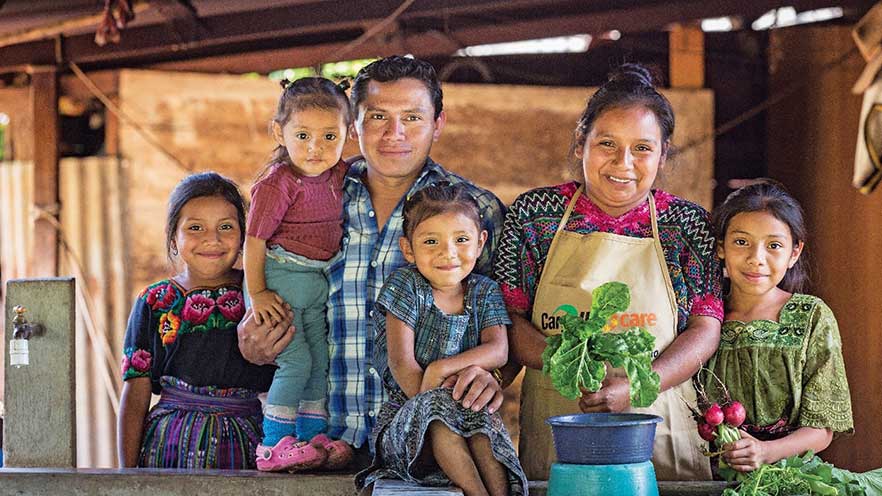A more resilient food system from soil to shelf: 5 highlights from New York Climate Week
“How do we feed a growing world in a time of disruption?”
That question shaped two powerful conversations during Climate Week 2025 — an annual gathering in New York where leaders from business, policy and civil society come together to accelerate climate action.
Cargill joined global partners for a fireside chat at Sustainability LIVE and a cross-sector panel at Economist Impact’s salon event, From Soil to Shelf: A Unified Approach to Building Resilient Food Systems.
From cocoa farms in Côte d’Ivoire to cornfields in Iowa, the discussions explored what’s working, what’s missing and how the food system must evolve to deliver food that’s more affordable, nutritious and more sustainable.
Here are five takeaways:
1. Food security and climate resilience are deeply connected.

The future of food cannot be separated from the health of the planet. As extreme heat, drought, flooding and water stress become more frequent, the global food system is being tested in new ways. With the global population expected to reach nearly 10 billion by 2050, the challenge is not just to produce more food — it’s doing so in a way that manages pressure on land, water and air.
“There's absolutely no way you can talk about the future of food unless you talk about climate action,” says Pilar Cruz, executive vice president and chief sustainability officer at Cargill. “The question that we ask ourselves every single day is, ‘How do we feed a growing population within planetary boundaries?’”
2. Real progress requires partnership.

No one company, sector or organization can build a more resilient food system on its own. Progress depends on trusted partnerships that bring together farmers, companies, NGOs and local experts — working side by side on practical solutions — from reducing emissions and restoring water to turning waste into value.
"We know we can't do it alone,” says Jim Andrew, chief sustainability officer at PepsiCo. “So we're always looking for partners. To scale this at the speed and scope we need, we need everybody in the boat — NGOs, governments, and, yes, other corporations. It still takes a lot of work. It takes a lot of trust. And it takes a real commitment around the purpose, the values, what we're all trying to do."
One example: Cargill’s partnership with PepsiCo and Practical Farmers of Iowa. Together, the organizations will support 240,000 acres of regenerative agriculture annually through 2030 — aligning with PepsiCo’s 10-million-acre goal and reaching producers directly in both companies’ shared corn supply chain.
3. Resilience starts with listening to farmers.

Farmers are on the front lines of climate change and food production — but their voices are too often missing from the conversations shaping the future of the food system. Solutions are more likely to succeed when they reflect farmers’ lived experiences.
“I think farmers around the world need more public recognition for our work,” says Antonio Cabrera*, president of Cabrera Group, a farming organization in Brazil. “I’m very appreciative to be here, because we see so many conferences and panels without a single farmer represented. It’s really important to have this space — because we’re the ones with skin in the game.”
4. Sustainability has to make business sense.

If sustainability efforts are going to scale, they must be built into how companies operate — not treated as something separate or optional. That means aligning with business outcomes like productivity, efficiency and long-term supply chain resilience.
“If we talk about using resources more efficiently or raising yields, that has secondary benefits for the planet. But it also just makes sound business sense,” says Alastair Child*, chief sustainability officer at Mars. “And if something makes business sense, it will scale. And that’s when systemic change happens.”
5. Investing in women strengthens the entire food system.

Resilience isn’t just about environmental challenges. It’s also about empowering an inclusive agricultural workforce. Today, 43% of food and agriculture workers are women. Investments in this growth — where women have access to land, financing, tools and training — can lead to stronger outcomes for families, farms and communities.
“It’s estimated that we could generate an additional $1 trillion in the food system if women had equitable access to land, seeds, markets, production and training,” says Michelle Nunn*, president and chief executive officer of CARE. “If you think about easy wins, in some ways there's nothing easier than simply tapping into half of the world's population who are incredibly important to the world's food systems, but that are not getting the full capacity and full contribution.”
Cargill’s long-standing partnership with CARE includes support for women-led savings groups across cocoa-growing regions in West Africa. These programs help women build income, launch small businesses and invest in long-term improvements — not only boosting household resilience, but also improving food security at the community level.
“At Cargill, we’re proud to partner across the value chain to turn bold ideas into practical action,” Pilar says. “Building a food system that is productive, sustainable and resilient — from soil to shelf — requires all of us.”
*Comments shared during Economist Impact's event at Climate Week.
Empowering women in agriculture
See how we’re supporting women in our supply chains and operations.

